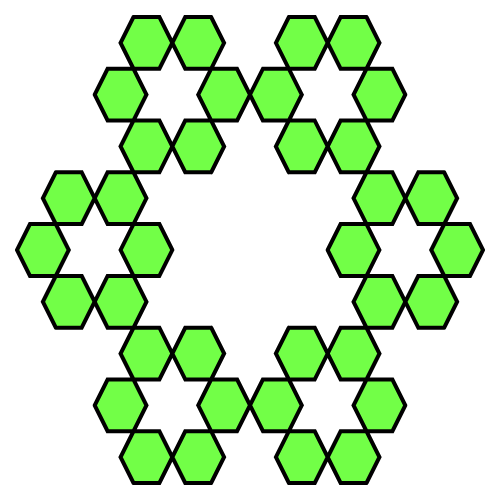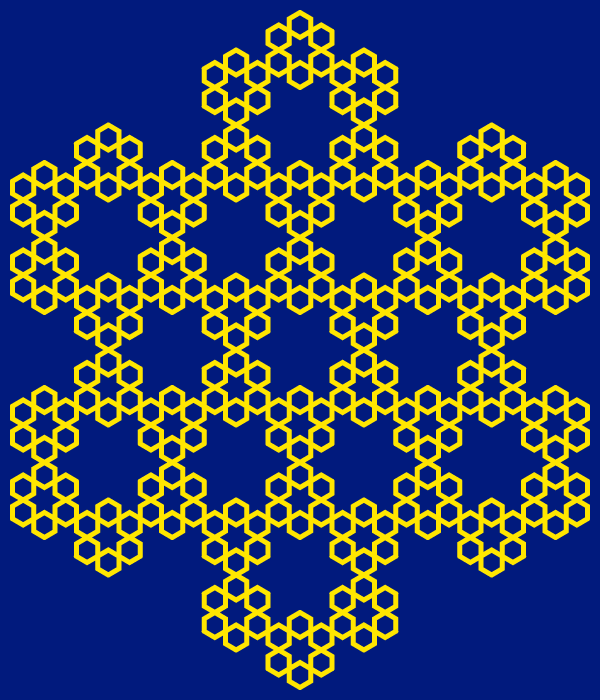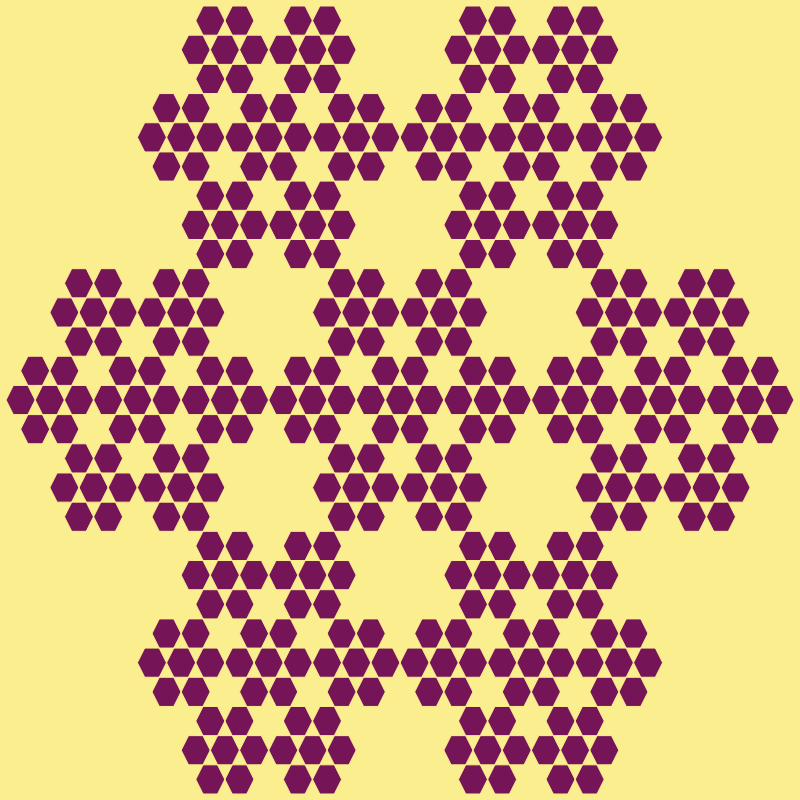This utility lets you draw colorful and custom hexaflake fractals. You can change the fractal's appearance by selecting one of its three types (regular, partial or full hexaflake), adjusting the depth of iterations, setting the dimensions of the canvas, and choosing the color palette. You can customize hexagon fill color, outline color, and canvas color. Fun fact - the hexaflake fractal can be constructed by projecting the Cantor cube onto the plane orthogonal to its main diagonal. Created by fractal fans from team Browserling. Fractabulous!
This utility lets you draw colorful and custom hexaflake fractals. You can change the fractal's appearance by selecting one of its three types (regular, partial or full hexaflake), adjusting the depth of iterations, setting the dimensions of the canvas, and choosing the color palette. You can customize hexagon fill color, outline color, and canvas color. Fun fact - the hexaflake fractal can be constructed by projecting the Cantor cube onto the plane orthogonal to its main diagonal. Created by fractal fans from team Browserling. Fractabulous!

This online browser-based tool illustrates various types of Sierpinski hexaflake fractal. This fractal, often simply called a hexaflake for short, was first discovered by Waclaw Sierpinski, a Polish mathematician. One of the most important properties of the hexaflake fractal is its self-similarity. The Sierpinski hexaflake is formed from a single hexagon, which then has smaller copies of itself placed at its vertices so that they all touch but not overlap. In some variations of the fractal, the seventh hexagon can be placed in the center of all other touching hexagons. With each iteration, the size of hexagons decreases by ⅓. You can almost instantly see the self-similarity pattern in this pattern – the new flakes have the same shape, structure, proportions as the whole fractal, except that they are on a different scale. Besides its self-similarity, it also has 6-fold symmetry. Hexaflake's exterior boundary is the Koch snowflake and the full boundary contains an infinite number of Koch snowflakes. Mind blowing and ingenious at the same time, or as we love to say – fractabulous!
This online browser-based tool illustrates various types of Sierpinski hexaflake fractal. This fractal, often simply called a hexaflake for short, was first discovered by Waclaw Sierpinski, a Polish mathematician. One of the most important properties of the hexaflake fractal is its self-similarity. The Sierpinski hexaflake is formed from a single hexagon, which then has smaller copies of itself placed at its vertices so that they all touch but not overlap. In some variations of the fractal, the seventh hexagon can be placed in the center of all other touching hexagons. With each iteration, the size of hexagons decreases by ⅓. You can almost instantly see the self-similarity pattern in this pattern – the new flakes have the same shape, structure, proportions as the whole fractal, except that they are on a different scale. Besides its self-similarity, it also has 6-fold symmetry. Hexaflake's exterior boundary is the Koch snowflake and the full boundary contains an infinite number of Koch snowflakes. Mind blowing and ingenious at the same time, or as we love to say – fractabulous!
In this example, we're creating the third stage hexaflake fractal from six hexagons. This hexaflake type omits the seventh hexagon from the center of the fractal. This fractal type is the original hexaflake that was studied by Sierpinski. We've also chosen the white for canvas, set its size to 500 by 500 pixels, adjusted the outline of hexagons to be 4 pixels wide and black color, and filled the hexagons with screaming-green color.
In this example, we're generating the partial hexaflake type. This type puts another hexagon in the center of all hexagons. It's called partial type because unlike full hexaflake (see next example) it only uses one extra hexagon. The hexagons in this example have a yellow border, which is 5 pixels thick and it's drawn on a resolution-blue background. We're also using rectangular space size of 600 by 700 pixels and adjusting the fractal orientation to up (which actually rotates fractal by 30 degrees).
This example generates the third type of hexaflake, which is the full hexaflake fractal. The key difference between the partial and full hexaflake is that the full hexaflake puts a hexagon in the center of every available hexagon (not just center as partial one). We've left hexagon outline color and width options empty and this fractal uses only two color palette – claret color for hexagons and a sweet-corn color the canvas.
You can pass options to this tool using their codes as query arguments and it will automatically compute output. To get the code of an option, just hover over its icon. Here's how to type it in your browser's address bar. Click to try!
Walk the Hilbert fractal and enumerate its coordinates.
Walk the Peano fractal and enumerate its coordinates.
Walk the Moore fractal and enumerate its coordinates.
Encode the Hilbert fractal as a string.
Encode the Peano fractal as a string.
Encode the Moore fractal as a string.
Encode the Cantor set as a string.
Encode the Heighway Dragon as a string.
Encode the Sierpinski fractal as a string.
Generate a Sierpinski tetrahedron (tetrix) fractal.
Generate a Cantor's cube fractal.
Generate a Sierpinski-Menger fractal.
Generate a Jerusalem cube fractal.
Generate a Jeaninne Mosely fractal.
Generate a Mandelbrot tree fractal.
Generate a Barnsley's tree fractal.
Generate a Barnsley's fern fractal.
Generate a binary tree fractal.
Generate a ternary tree fractal.
Generate a dragon tree fractal.
Generate a de Rham curve.
Generate a Takagi-Landsberg fractal curve.
Generate a Peano pentagon fractal curve.
Generate a tridendrite fractal curve.
Generate a Pentigree fractal curve.
Generate a lucky seven fractal curve.
Generate an Eisenstein fractions fractal curve.
Generate a Bagula double five fractal curve.
Generate a Julia fractal set.
Generate a Mandelbrot fractal set.
Generate a Mandelbulb fractal.
Generate a Mandelbox fractal.
Generate a Buddhabrot fractal.
Generate a Burning Ship fractal.
Generate a toothpick sequence fractal.
Generate an Ulam-Warburton fractal curve.
Generate an ASCII fractal.
Generate an ANSI fractal.
Generate a Unicode fractal.
Generate an emoji fractal.
Generate a braille code fractal.
Generate a fractal in audio form.
Create a fractal that looks like one but isn't a fractal.
Generate a fractal from any text.
Generate a fractal from a string.
Generate a fractal from a number.
Join any two fractals together.
Create a completely random fractal.
Set up an arbitrary IFS system and iterate it.
Recursively transform an image using IFS rules.
Run infinite compositions of analytic functions.
Create a surface that mimics a natural terrain.
Create a fractal surface via Brownian motion.
Apply fractal algorithms on your image and make it self-similar.
Find fractal patterns in any given image.
Find fractal patterns in any given text.
Find fractal patterns in any given number.
Tessellate a plane with fractals.
Run a cellular automaton with custom rules.
Play Conway's Game of Life on an infinite grid.
Subscribe to our updates. We'll let you know when we release new tools, features, and organize online workshops.
Enter your email here
We're Browserling — a friendly and fun cross-browser testing company powered by alien technology. At Browserling our mission is to make people's lives easier, so we created this collection of fractal tools. Our tools have the simplest user interface that doesn't require advanced computer skills and they are used by millions of people every month. Our fractal tools are actually powered by our web developer tools that we created over the last couple of years. Check them out!




